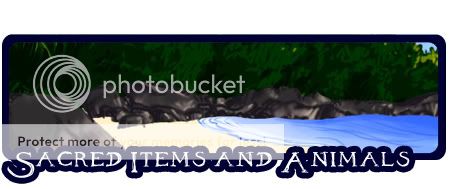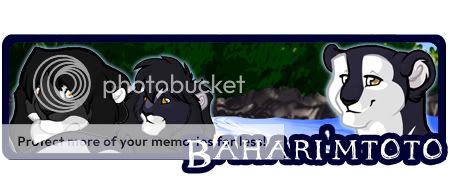|
|
|
|
|
|
|
|
|
 Posted: Tue Oct 02, 2007 7:54 am Posted: Tue Oct 02, 2007 7:54 am
|
|
|
|
|
|
|
|
|
|
|
 Posted: Tue Oct 02, 2007 8:09 am Posted: Tue Oct 02, 2007 8:09 am
 |
 |
 |
 |

Q. I'm not sure whether or not I want to join at the moment. Do the pride allow others to stop over in their land and explore?
The pride are receptive to visitors, however, please be aware that there will be some areas where you aren't going to be allowed to explore. For example, there will be no access to the Nursery without expressed permission from the ruler of the pride and even then, the individual would be escorted by the guards.
That being said, the pride welcomes and encourages others to explore and enjoy what the region has to offer so feel free to visit and meet the regulars!
Q. Are non-lions allowed in the area or allowed to join the pride?
The pride appreciate all creatures and recognise what advantages they can bring to the pride, as such, all species are allowed to join.
Q. I want my cub to RP on the borders or go swimming in the sea!
Swimming yes, borders no. In order to keep the cubs safe they aren't allowed to approach the border until they are adolescents.
Q. Why can't my cub do what I want?
The pride is very worried about their cubs and all members at the moment. The cubs are the future of the pride they will not tolerate cubs going missing and in case something happens they want to know where all cubs are!
Q. Are gods allowed to visit the region?
Gods are permitted to visit this pride but please be aware that if they aren't benevolent we would prefer that the owner contact the pride owners first. The Bahari'mtoto have had enough tragedy for a while and need time to recover before we unleash more drama.
Q. Are the Bahari'mtoto open to pride alliances?
Yessum!
Q. Are the Bahari'mtoto open to pride vs pride plots?
There is potential for this, but not for a while to come! |
 |
 |
 |
 |
|
 |
 |
|
|
|
|
|
|
|
|
|
|
|
|
|
|
|
|
|
|
|
|
|
|
|
|
 Posted: Tue Oct 02, 2007 9:25 am Posted: Tue Oct 02, 2007 9:25 am
 |
 |
 |
 |

Shells: The lions of the Bahari'mtoto regard shells very highly, and some types more than others. The flat scalloped type shells are beautiful ornaments and decorations for body and den. Cowries are very rare and sometimes plaited into manes and tails by friendly coast-dwelling birds. But the most precious of shells are the spiralled, conical shells. Once home to hermit crabs, these shells positively glow with the life of the Ocean and are held as dear keepsakes. A Bahari'mtoto lion will ask loved ones to whisper into the shell, so that when the lion feels lonely, it need only listen to its shell to hear them again.
Mermaids Purse (shark egg): These are considered very bad luck indeed. For the Ocean to throw one of its many creatures onto the shore at a time when it hasn't even fully developed is a sign of forboding and possible looming storm. The egg should be returned to deeper waters, but that is not always a gurantee of a clear day.
Jellyfish: Also another bad luck charm, these are to be avoided entirely because of their sting.
Sea-stars (starfish/urchins): The Bahari'mtoto pride regards these as good luck, not only from the Sea, but from the moon, as well. Sea-stars are seen as signs of recognition and love from the moon god, and are thought of as 'rewards' for being loyal to the Sea and moon. If sea-stars are not abundant, the pride will make more than one offering a day. Quite often, sea-stars are plucked from the beach and taken to rockpools, so that there’s always a good luck charm handy.
Driftwood: Driftwood is always met with mixed reactions. Its a dead thing that washed up on shore, but it has its uses. An offering of thanks is usually given after finding driftwood, to settle any ill-will the driftwood might have with it. It can signify fragility and the splintering of something in life, so some lions just prefer to leave it alone.
Seagulls/Warm-water Penguins: These birds are far from the birds of the savannah, with their screeching kakawing and aerial acrobatics above the water, and in some cases IN the water. They share the territory with these birds and generally don't hunt them. Rather, they try to barter with them, knowing sea-faring birds can be useful for many things, such as fashioning items, acting as look-outs, or even for fishing larger prey.
Sharks/Dolphins/Whales/Seals: These beasts are not always interacted with but are definitely seen along the coast, sometimes more at certain times of year. Original beliefs hold that these great beasts of the sea used to be lions of the land, and were granted a life in the water with the sea goddess after great deeds and an honourable existence.
Fish: The staple diet of the Bahari'mtoto is the same as any other lion - red meat from the plains just outside the pridal borders and within the stretch of jungle. However, at certain times of year, fish can be found in the shallows of the beach cove and even in the mouth of the river. At this time, fish are a delicacy and to be caught whenever possible. The skeletons of the fish may even be saved and used as jewelry, a sign of a good hunter.
Human items: Of course, unless told, your average lion will not know if an item has been fashioned by a human or not. However, that doesn't mean they're worthless or more precious than most. Its generally seen that human items might have more meaning for each individual lion as opposed to the pride as a whole, although suspicious or beneficial items should be shown to the Mkuru-maji. If they are beneficial, the finder has an opportunity to become the 'keeper' of such a useful item. |
 |
 |
 |
 |
|
 |
 |
|
|
|
|
|
|
|
|
|
|
|
|
|
|
|
 Posted: Mon Sep 08, 2008 1:32 pm Posted: Mon Sep 08, 2008 1:32 pm
 |
 |
 |
 |

Patron Gods/Goddesses of the Bahari’mtotoThese deities are revered with the utmost respect in the Bahari'mtoto...Yemaya, Goddess of Oceans Bahari’nswi, God of Fish Lewatle kgangwa, Goddess of the Drowned Afa’kivuli, God of the Moon Tamu’dihaka, God of Water Juuku, God of Surf Special HomageThese deities are recognised to have provided assistance or favour in some way...Arimathras, Goddess of Harvest
Dabiku'Asante (Offering of Thanks): Throughout the year, any lion can give thanks for anything they feel truly blessed with in their life. An offering is usually made up of things that the Sea has granted them - shells, fish bones, seaweed, and even strands of fur from any recently born cubs. They arrange them into something what will easily be lifted by the tide as it moves in, like a necklace, etc.
Mwezifichika (time of no moon): This is a time of fear for the Bahari'mtoto. At the time of a new moon, when it simply isn't lit up in the sky, the Bahari'mtoto fear that the moon god has left them, and that the Sea will become tumultuous in his absence. Many offerings of peace are made over the couple of days until the moon starts to wax once more.
Ba'Kifa (Rites of the Dead): When a member of the Bahari’mtoto passes on, they must be reunited with the life-giving Sea. A large piece of driftwood or a large leaf is gathered and the deceased laid upon it. It is a time of reflection and reverence, the ceremony is held at night by moonlight. Taken to the shallows of the cove, the deceased is allowed to drift out to Sea, taken by the tide to be reunited with the sea goddess and then judged by their life's deeds. Items of importance from family and friends are then left on the beach for the sea to claim, so that the deceased have memories of their life on land.
Ba'Ushufo (Rites of Passage): Every youngster must perform this Rite at sometime in their life, no matter how much they want to avoid it. It is a symbol of becoming an adult in the eyes of the pride. They are old enough, wise enough, and strong enough to provide for themselves. It can also be a dangerous Rite and thusly presided over by family or other members of the pride who are strong swimmers. The adolescents must wade out onto the beach as the tide begins to roll in. They must stand there, letting the ever growing waters wash over them repeatedly, a sign of youth being stripped away for adulthood. Its a test of endurance and willpower. Anyone not strong enough to be an adult yet can turn back to the shore, to their family, but they will never be allowed the great things that come with adulthood. Those that stay, they wait until the waters have started to lift their paws from the sands and then they must swim back to the shore, to be welcomed with gleeful roars of pride from family and friend alike. It is at this point that they are given one item of significance to be weaved into manes or tails, or to be worn as a sign of them being an adult.
Note; In OOC terms, this is when you submit for a rank change by the colourist, otherwise your lion will default to kinengwe. Also, this is meant to be seen as a child's ability to hunt for themselves and help with the pride. It DOES NOT mean they are adults and adolescent breeding is still highly discouraged.
Ba’Bandika (Rites of Joining): This is basically a repetition of the Ba’Ushufo but for new members of the pride. It is mandatory, and will be done during the joining RP so it all gets done at once.
Ba'Chaguliwa (Dawn of a New Leader): This ritual shares much in common with the Rites in that a new leader must be tested as much as new members and new adults. They must likewise be washed over by the Sea, but rather than the shore, they must perform this ritual in the more dangerous rocky outcrops. Their task is stay on those rocks. To master their will over the Sea, to prove they have what is required to lead and to tame, to appease and to nurture. It is fair to say that quite often in the Bahari’mtoto, most leaders are never the first choice of the resigning leader - many lions perish in this ritual. If the lion survives, they are then the new leader of the Bahari’mtoto, in this case the Mkuru-maji as instated by Tamu.
Mzao‘barakiwa (blessed birth): New life is always precious. In the Bahari’mtoto, all new lives are blessed by the ruler, and quite often some of the Mtaguso-maji as well. Once the mother has recovered enough from the birth, the Mkuru-maji and any company summon the mother and cubs to the beach at low tide, when waters are calm. A litlte piece of fur from the cubs’ tails are chewed off and then dropped into the waters, followed by a small offering from the parents (most likely also a piece of fur or a precious object). The cubs are then lightly dabbed with some sea water on their heads by the Mkuru-maji.
Oana‘barakiwa (blessed union): Not a mandatory ceremony, but is highly encouraged as a show of one’s love for another, and can be repeated any number of times during a lifetime. It is basically a combination of a giving of thanks and a blessing. The couple to be blessed give thanks for having found each other, and are then in turn blessed by the Mkuru-maji and various Mtaguso-maji. The couple exchange gifts they have received from the sea, such as shells, fish bones, etc, to wear like wedding rings and show they are bonded. |
 |
 |
 |
 |
|
 |
 |
|
|
|
|
|
|
|
|
|
|
|
|
|
 Posted: Mon Sep 08, 2008 1:35 pm Posted: Mon Sep 08, 2008 1:35 pm
 |
 |
 |
 |

Mkuru-maji (leader)
In the Council, one member is appointed the leader, the peace-keeper of them all. They must be non-biased, neutral to all things and capable of making decisions and weighing facts. Its the Mkuru's duty to see to it that the Council operates in the best interests of the pride and nothing else. They are the equivalent of a king or queen and THE authority in the pride.
Mtaguso-maji (council)
Mtaguso are the rest of the council. All lions of any gender or background are accepted if they feel they have enough to offer. They liaise with the Mkuru-maji personally whenever they encounter problems within their specific field or feel that something may need changing.
- Spiritual
- Guardian
- Hunting
- Construction
- Welfare
- Diplomacy
jana (treasured child)
The name given to royal cubs until they reach adolescence (when they attend Ba’Ushufo).
mshauri (advisor)
General wise lions who can offer their knowledge or age to aid the pride. Seers are also grouped into this.
nyangumi (guard)
A guard's duty is to patrol the territory, either alone in shifts, or in teams, and welcome newcomers who present themselves as friendly. Its also their job to root out the troublemakers and also prevent the troublemakers from getting in. They are also on a rota so that they take turns guarding the nursery.
Bumani (builders)
These are the lions that are there to help rebuild the pride, this will include dens and the nursery. This will be a position for the stronger lions as they will need to be able to build structures that won't fall apart if the wind blows.
kinengwe (hunter/huntress)
Your average lion, most newcomers will be this position, as will most growing cubs unless they choose a certain vocation.
pomboo (youth)
Cubs, juves and adols alike, anyone who has not attended Ba'Ushufo. After Ba'Ushufo, an individual is considered mature enough to take on responsibilities that aid the pride, but are still seen as precious youngsters and are therefore expected to still spend at least some time with the pombuka and pomithi of the pride, possibly helping with the younger generation. While the pomboo are young they are brought up by the pombuka and pomithi occasionally they may go with parents to see what they are up to but this is a RARE thing. They are brought up in the centre of the pride and do not visit the borders until they are at least juves.
pombuka (child-sitter)/pomithi (story-teller)
A responsible lion or lioness, who can handle a multitude of cubs and keep them entertained, they are the main child-rearers in the pride. Families are expected to have a part in the raising of offspring, but prides are busy places and children are to be kept within the safety of the inner pridal territory with the pombuka and pomithi. Some pombuka even become adoptive parents to those who may have been rejected.
mwani (healer)
There can be as many mwani in the pride as needed, perhaps every member has some basic training and knowledge of healing plants and methods. But generally, there are one or two mwani's who devote their time to investigating the healthy properties of the surrounding florae.
Hlare (medicine makers)
Due to the mass of injuries that have arrived as of late, the new position is so that all medicines can be ready when they are needed and so the mwani have more time to check everyone over while the hlare prepare the medicines.
|
 |
 |
 |
 |
|
 |
 |
|
|
|
|
|
|
|
|
|
|
|
|
|
|
|
 Posted: Mon Sep 08, 2008 1:40 pm Posted: Mon Sep 08, 2008 1:40 pm
|
|
|
|
|
|
|
|
|
|
|
 Posted: Tue Dec 30, 2008 3:59 am Posted: Tue Dec 30, 2008 3:59 am
 |
 |
 |
 |
 Note: Map is not to scale, while features are drawn close to each other on the map they are a lot more extensive. Feel free to set your own distances as you see fit. Note: Map is not to scale, while features are drawn close to each other on the map they are a lot more extensive. Feel free to set your own distances as you see fit.
Caves (1)
Once the home to the royal family, this has now been re-purposed to act as the "seat of power" for the Bahari'mtoto. These particular caves, based on the outcroppings, are used when the Bahari'mtoto pride leader holds counsel with his advisers, or during periods when great announcements are made.
While there are caves below that of the council, they do not make for good dens due to how cold and damp they are, however they do make for ideal pearl farming!
Jungle (2)
Considerably more comfortable than the caves, most lions make their homes here, as there is ample room for dens. Here is also where a lot of hunting takes place, taking advantage of forest deer, avians, primates, rodents, warthogs, and any grazers that should happen to pass through on their way towards the river. It is not a dense jungle, and fairly sparse in places, the ground is a strange spongy mix of earth and sands.
River (3)
The Bahari’mtoto may worship the sea, but they still need to drink fresh water! Thankfully, one such river winds through and behind the jungle, but beware - its recommended that lions drink from much further up the river, as it starts to mesh with salty water in the estuary.
Cliffs and Outcroppings (4)
There is a combination of high and shallow cliffs abound in the Bahari’mtoto territory. Thankfully, the most dangerous of which are generally inaccessible. Lions generally use this to make more direct offerings to the sea, simply dropping items into its moving waters from the end of the stone path. It is also the place of the Ba’Chaguliwa.
Coastal Bay (5)
The main area of the Bahari’mtoto lands, that which it is famous for. Beautiful sands and dunes and grasses.
Hunting Grounds (6)
There is more the Bahari'mtoto lands than just the beach and cove. Beyond the dunes and rocks lies an slightly undulating landscape with some rocks and boulders breaking through the skin of the earth. The grass is long, yellowed, dry, the odd patch of trees. Herds do wander through often and the odd stray goat from a farmer gets lost this way.
Fog-Bound Islands (7)
Once hidden from view by thick fog, these four islands have recently been revealed as its residents have made the journey from their home to the mainland. Ravaged by the tsunami, their supplies and numbers dwindled to the point that they required immediate assistance. Since these islands have been revealed, it's inhabitants have all been embraced into the Bahari'mtoto as family.
Former colonists and Bahari'mtoto alike are allowed to make their homes on these islands or on the mainland.
Note that these islands are slightly more exposed to harsher climates and may not be entirely appropriate or safe for young cubs.
*These islands can be accessed by a strong swimmer or during low tides when sand bars become visible and can be walked upon (pink dotted lines). |
 |
 |
 |
 |
|
 |
 |
|
|
|
|
|
|
|
|
|
|
|
|
|
|
|
 Posted: Sun Mar 08, 2009 2:31 pm Posted: Sun Mar 08, 2009 2:31 pm
|
|
|
|
|
|
 |
|
|
|
|
|
|














